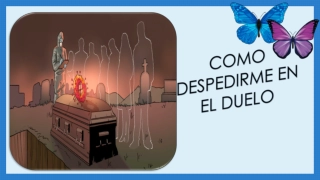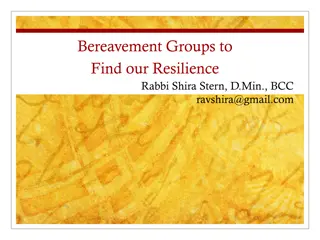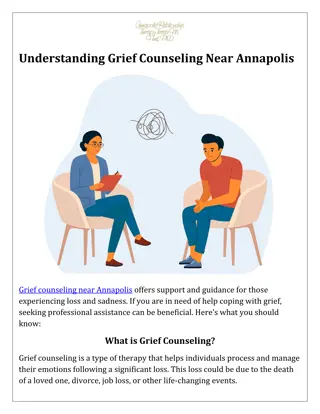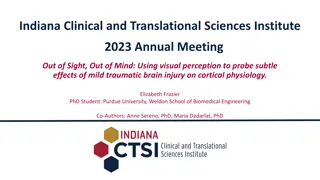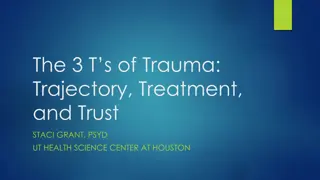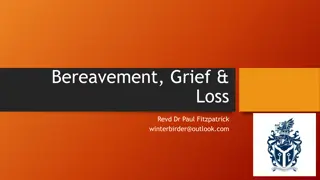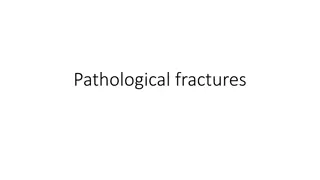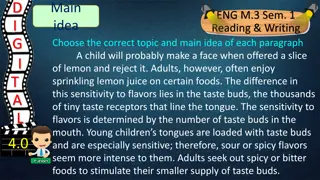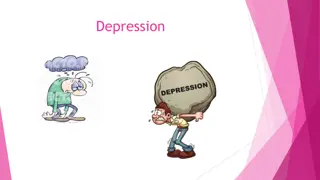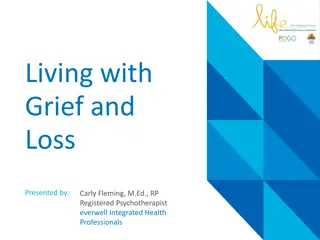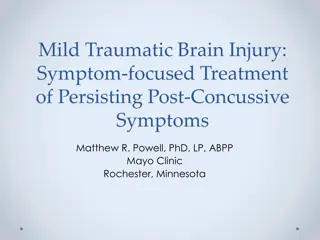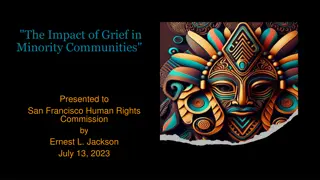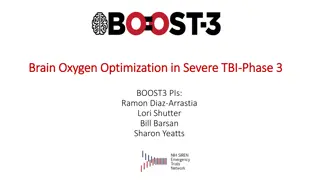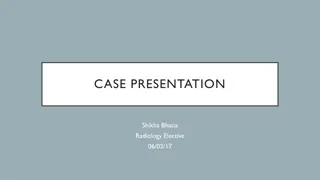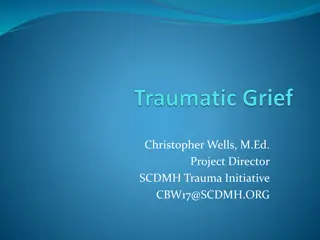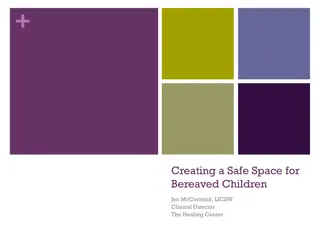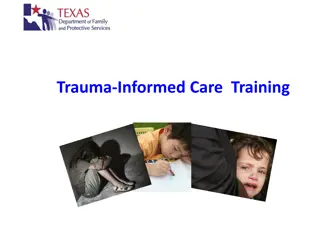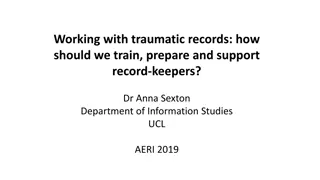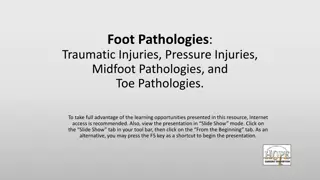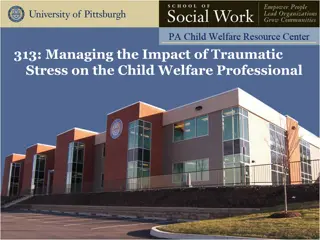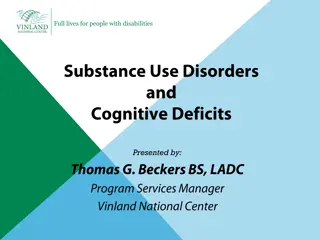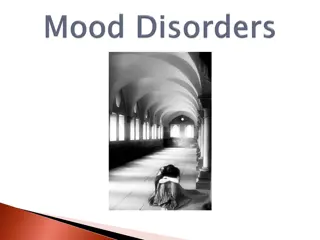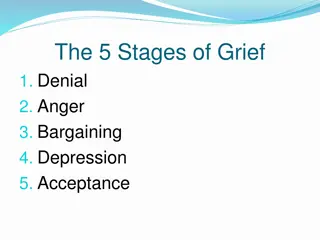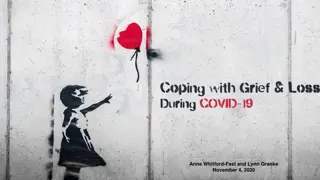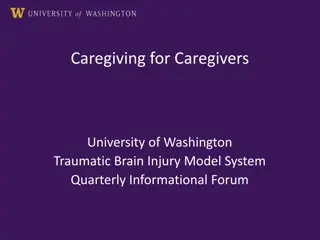Understanding the Grief Process: Coping with Loss and Grief
Grief is a painful, dynamic, and personal process that occurs when facing a significant loss. It is essential to embrace grief rather than deny or suppress it, as it can have significant effects on the individual. In our culture, there is a tendency to avoid suffering, but it is crucial for those gr
2 views • 23 slides
Understanding Venous Thromboembolism in Orthopedic Patients
This educational content covers the basics of deep vein thrombosis (DVT) and pulmonary embolism (PE), including definitions, pathophysiology, risk factors, prevention strategies, diagnosis, and treatment. Traumatic and non-traumatic risk factors for VTE in orthopedic patients are discussed, emphasiz
0 views • 36 slides
Understanding Loss, Grief, and Dying: Insights for Nursing Practice
Delve into the concepts of loss, grief, and dying in healthcare settings. Explore different types of loss, the functions of grief, and nursing interventions for grieving or dying clients. Learn about the signs and symptoms of grief, and discover how to apply the nursing process to support clients an
1 views • 36 slides
Understanding Grief and Finding Resilience in Bereavement Groups
Bereavement groups led by Rabbi Shira Stern offer support for those experiencing grief, highlighting the unique language of grief and the importance of allowing individuals to navigate their emotions. The journey of grief is explored through images and verses, depicting the stages of denial, anger,
4 views • 29 slides
Understanding Grief Counseling Near Annapolis
Grief counseling near Annapolis offers support and guidance for those experiencing loss and sadness. If you need help coping with grief, you can find professional help.
2 views • 3 slides
Investigating Visual Perception Effects of Mild Traumatic Brain Injury
Elizabeth Frazier, a PhD student at Purdue University, explores the subtle effects of mild traumatic brain injury (mTBI) on cortical physiology using a novel two-alternative forced choice task in mice. The study aims to bridge visual deficits and cortical circuitry changes post-mTBI to improve diagn
0 views • 5 slides
Understanding the 3 Ts of Trauma: Trajectory, Treatment, and Trust
This comprehensive guide delves into the critical aspects of trauma - Trajectory, Treatment, and Trust. It covers the definition of trauma, PTSD symptoms, potentially traumatic events, trajectories of traumatic stress, and the impact of trauma on mental health. Explore the effects on behavior, biolo
0 views • 29 slides
Understanding Bereavement, Grief, and Loss: Historical Perspectives and Contemporary Models
Explore the concepts of bereavement, grief, and loss through the historical perspectives of Freud's Melancholia and Elizabeth Kubler-Ross's Stage Model. Understand the significance of these terms, their impact on individuals experiencing loss, and the evolution of grief and loss models over time.
0 views • 20 slides
Understanding Urological Emergencies: Causes, Symptoms & Treatment
Discover the different types of urological emergencies, both traumatic and non-traumatic, including hematuria, renal colic, urinary retention, acute scrotum, and more. Learn about the causes, symptoms, and immediate treatments required for these urgent urological conditions. Find out how to identify
3 views • 67 slides
Understanding Fractures: Traumatic vs. Pathological and Modeling Options
Defining the distinction between traumatic and pathological fractures, exploring the relationship between non-traumatic fractures and underlying bone pathologies, and discussing modeling options for classifying fractures. Stress fractures, insufficiency fractures, and the causes of pathological frac
2 views • 8 slides
Understanding Traumatic Reticuloperitonitis in Cattle
Traumatic reticuloperitonitis, also known as hardware disease, is a serious condition in cattle caused by the ingestion of foreign objects. The perforation of the reticulum wall leads to peritonitis and potential complications affecting various body systems. Recognizing the clinical signs, such as s
0 views • 10 slides
Understanding Prognosis in Traumatic Brain Injury
Prognosis in traumatic brain injury is influenced by various factors such as population characteristics, impairment levels, and time frames. Predicting short-term and long-term outcomes is crucial for effective patient care, financial planning, and resource utilization. Common outcome measures inclu
0 views • 46 slides
Contrasting Reactions to Flavors and Traumatic Events
Children and adults demonstrate varying responses to flavors influenced by the number of taste buds in their mouth, while individuals affected by traumatic events like earthquakes can experience lasting changes in their sense of security, as seen through different behaviors and reactions over time.
0 views • 17 slides
Understanding Grief vs. Depression: A Guide for Supporting Students
Grief and depression are complex emotional experiences that can impact individuals differently. This guide provides insights into distinguishing between grief and depression, helping you support students through the grieving process effectively. Learn how to identify signs, educate on the grieving p
0 views • 40 slides
Understanding Grief and Loss: A Therapist's Perspective
Discover the normal process of reacting to loss, the emotional and physical reactions to grief, and strategies to navigate through grief effectively. Explore the connection between grief, survivor guilt, and personal growth as presented by registered psychotherapist Carly Fleming, M.Ed.
0 views • 13 slides
Understanding Mild Traumatic Brain Injury and Treatment Options
Exploring the pathophysiology and clinical recovery of mild traumatic brain injury (mTBI), along with the risk factors for persisting post-concussive symptoms. The importance of diagnosing mTBI and the impact it has on individuals. Highlighting the neurometabolic cascade and functional injuries asso
0 views • 37 slides
Understanding Grief and Loss: A Spiritual Perspective
Exploring the different facets of grief and loss, this content delves into definitions, types of loss, the grieving process, and responses to grief. Touching on the stages of grief and the emotional complexities involved, it offers insights on how to navigate this challenging journey with spiritual
0 views • 17 slides
The Impact of Grief in Minority Communities: Understanding Trauma, Grief, Loss, and Stigma
Exploring the emotional responses of trauma, grief, and loss in minority communities, this presentation sheds light on the physical, emotional, and behavioral symptoms associated with such experiences. It also delves into the stigma surrounding mental health in Black and Latinx communities, highligh
3 views • 24 slides
Traumatic Reticuloperitonitis (Hardware Disease) in Cattle: Causes and Clinical Signs
Traumatic reticuloperitonitis, also known as Hardware Disease, is a common condition in cattle caused by the ingestion of foreign objects. This article discusses its etiology, pathogenesis, and clinical findings such as sudden onset of rumino-reticular atony and decreased milk production. Perforatio
0 views • 10 slides
Brain Oxygen Optimization in Severe Traumatic Brain Injury (BOOST3) Trials Overview
Overview of the BOOST3 trials focusing on brain oxygen optimization in severe traumatic brain injury patients. The trials involve multiple PIs, training sessions, and hands-on ancillary studies. Various design principles and organizational values are emphasized, with grant awards distributed to diff
0 views • 13 slides
Complex Radiology Case: Multiple Traumatic Injuries in an Elderly Female
A 77-year-old female presented with multiple traumatic injuries after falling headfirst down stairs. Imaging revealed a comminuted inferior orbital wall fracture, facial lacerations, spinal fractures, and cervical cord syndrome. Lab findings indicated preexisting conditions like osteopenia, hyperten
0 views • 18 slides
Grief Child: Chapter 1 Analysis
In Chapter 1 of "Grief Child," the protagonist, Adu, experiences a haunting nightmare involving a giant leopard. His father, Nimo, is concerned about the ominous dream that signifies trouble for the family due to their totemic beliefs. The chapter delves into the character traits of Nimo, a hardwork
2 views • 9 slides
Understanding Traumatic Grief and Bereavement: A Comprehensive Overview
Explore the complexities of traumatic grief, bereavement, and loss through a detailed examination of definitions, theories, stages, symptoms, impact, and risk factors. Unpack the nuances of acute grief, integrated grief, and the coping mechanisms individuals utilize when faced with profound loss. Ga
1 views • 117 slides
Understanding Ambiguous Grief: The Three Parts and How to Help
Exploring the concept of ambiguous grief, this presentation by Amy Flaherty discusses the three components of grief - loss, longing, and feeling lost. It delves into what ambiguous loss can look like in various life events and offers insights on how to support clients dealing with this type of grief
0 views • 14 slides
Understanding Children's Grief and Development: Creating a Safe Space
Explore the nuances of children's grief and developmental stages, emphasizing the importance of providing a safe space for bereaved children. Delve into the unique ways children perceive and process loss, and discover strategies to support them through experiential activities, discussions, and group
0 views • 47 slides
Understanding Trauma-Informed Care Training
Trauma-Informed Care Training involves understanding child traumatic stress, recognizing the effects of trauma on child development, behaviors, and functioning, as well as preventing and coping with Compassion Fatigue. It emphasizes creating safety for both providers and survivors and empowering sur
0 views • 55 slides
Understanding Compassion Fatigue, Burnout, and Grief in Caregiving
Explore the nuances of compassion fatigue, burnout, and grief in caregiving roles, delving into the signs, stages of grief, and strategies for managing stress and letting go. Learn about different types of losses and warning signs to watch out for to maintain emotional well-being.
0 views • 25 slides
Supporting Record-Keepers Dealing with Traumatic Records
Understanding the impact of traumatic experiences on record-keepers is crucial in training, preparing, and supporting them. Trauma, whether singular, ongoing, or complex, can be represented in records stored in archives. The potentiality of records to carry traumatic experiences requires a thoughtfu
0 views • 15 slides
Traumatic Reticulopericarditis in Livestock: Causes, Symptoms, and Management
Traumatic reticulopericarditis in livestock is caused by penetration of the pericardial sac by a migrating metal foreign body, leading to pericarditis, toxemia, and congestive heart failure. Clinical signs include depression, anorexia, respiratory distress, and bilateral jugular distension. If chron
0 views • 13 slides
Understanding Foot Pathologies: Traumatic Injuries and Pressure Injuries
Explore common foot pathologies including traumatic injuries like plantar fasciitis, turf toe, and sprains, as well as pressure injuries such as plantar ulcers and heel spurs. Learn about the causes, symptoms, and treatment options for these conditions.
0 views • 33 slides
Managing Traumatic Stress in Child Welfare Professionals
Learn to identify, recognize, and manage traumatic stress as an occupational hazard in the child welfare profession. This program helps professionals assess the impact of traumatic stress and personal strengths, develop strategies to promote resiliency, and understand the importance of safety and cu
0 views • 30 slides
Full Lives for People with Disabilities - Addressing Traumatic Brain Injury
Traumatic Brain Injury (TBI) presents a significant public health concern in the United States, often termed as the silent epidemic due to its hidden nature. This condition affects thinking and memory, impacting individuals' lives profoundly. Resources such as "The Essential Brain Injury Guide" shed
0 views • 23 slides
Understanding Grief and Depressive Disorders: A Comparative Analysis
Grief and depressive disorders share similarities but also have distinct differences. Grief is a universal emotional state following loss, while depressive disorders involve prolonged mood disturbances. The stages of grief include denial, anger, bargaining, depression, and acceptance, with intervent
0 views • 79 slides
Understanding Traumatic Reticuloperitonitis in Cattle
Traumatic reticuloperitonitis in cattle is a severe condition caused by the penetration of the reticulum by metallic foreign objects. The ingestion of these objects leads to acute local peritonitis, with symptoms like anorexia, decreased milk yield, and pain during movement. If left untreated, it ca
0 views • 16 slides
Understanding the 5 Stages of Grief and How to Help Others Through Them
The 5 stages of grief - Denial, Anger, Bargaining, Depression, and Acceptance - are explored, with tips on how to support those experiencing them. Grief doesn't follow a linear path, and cultural, personal, and situational factors influence how individuals grieve. Children coping with loss should be
0 views • 10 slides
Cognitive and Behavioral Management Strategies for Traumatic Brain Injury Patients
This presentation focuses on addressing challenging cognitive, behavioral, and personality issues associated with traumatic brain injury (TBI). It outlines cognitive issues such as attention, speed of processing, learning, memory, and executive functioning. Cognitive management strategies include te
0 views • 18 slides
Understanding Different Aspects of Grief: Pre- and Post-Pandemic Perspectives
Exploring various dimensions of grief, including anticipatory grief, disenfranchised grief, cumulative grief, collective grief, and comparative suffering. The article discusses how individuals experience and cope with grief before and during the pandemic, shedding light on the diverse manifestations
0 views • 12 slides
Understanding Caregiving for Traumatic Brain Injury Survivors
Caregiving for individuals with Traumatic Brain Injury (TBI) is a crucial yet challenging role undertaken by family members or friends. The responsibilities can be overwhelming, impacting both the survivor and the caregiver's well-being. This presentation highlights the needs of caregivers, survivor
0 views • 22 slides
Understanding Post-Traumatic Stress Disorder (PTSD) and Trauma
Post-Traumatic Stress Disorder (PTSD) is a psychological condition that may develop after a person experiences a traumatic event. Trauma can result from various incidents such as accidents, natural disasters, abuse, or war, leading to personal reactions and challenges in one's perceptions. Victims o
0 views • 104 slides
Understanding and Coping with Grief in Missionary Service
Discover insights on overcoming intense emotional suffering in missionary work. Explore the various losses that can escalate grief, and learn practical steps to address and process these challenges. Embrace honesty, seek knowledge, and lean on your Christian faith to navigate the complexities of gri
0 views • 24 slides
